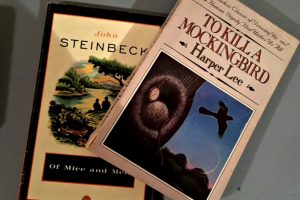Baby you’re so classic
Teachers wrestle with the purpose of teaching classic literature
There’s a lot to be learned from the classics, but is the effort worth it?
February 16, 2017
The Picture of Dorian Gray is a scandalous gothic novel written about a young Dorian Gray who sells his soul for youth and beauty. It’s filled with one-liners and vivid portrayals of upper-class refinement in 1890’s. The novel made Oscar Wilde one of the great voices of the Aesthetic movement and earned him a spot beside some of the greatest authors in history.
Classics like The Picture of Dorian Gray convey messages about life through complex themes and have been a part of American education for more than a century, but more and more teachers are questioning the value of teaching classic literature. Are classic books – referred to by many as the cannon – still needed?
“If you can get the same value with less resistance form more modern books, like books in the YA genre, why even teach the classics? I do believe that there is truth in that idea, that one can derive the same value from a more modern book with much less resistance,” said Mrs. Kimberly Trostle, who was the AP Literature teacher at Bellwood-Antis from 2007-2015. “But I believe that’s exactly why we should teach the classics. They provide a challenge, both in language and ideas.”
Classic literature is challenging and for good reasons. Many classics have frame stories, symbolism, motifs, and other devices that are at the heart of the study of literature, and recognizing them requires maturity and sophistication from a reader.
“I teach Romeo and Juliet with ninth grade, and we talk about classic literature being timeless and universal,” said B-A English teacher Mr. Kerry Naylor. “It has themes you can relate to no matter what time period you are in or what culture you are from. If novels are written in a way that resonates with people they are going to last.”
Senior Brayton Coover, who took AP Literature as a junior, agreed that classics still touch the lives of students in the 21st Century.
“It’s impressive that books written 100 years ago can still have an impact,” he said. “There are a lot of classics that pose questions that are still prevalent today. Certain themes and ideas are never going away.”
Although it is becoming a problem to get classic literature into classrooms and the daily reading routine of high school students, current AP Literature teacher Mrs. Alyssa Cunningham said it is all about it being challenged.
“Even though classic literature can be difficult, students need to be challenged in order to grow. An essential part of learning is to be challenged. When students are faced with the challenge of reading and analyzing classic literature, they not only become better readers, but also better thinkers,” said Mrs. Cunningham.
Another problem English teachers face at Bellwood-Antis and elsewhere is getting students to read books outside of their comfort zone, and most of those novels are the classics.
“It’s great to read books like Divergent, which are high-interest and easy to read, but while books like that are enoyable they don’t necessarily push a student as a reader. It’s very easy to read them fluently,” said Mr. Naylor. “It’s our job as high school teachers to try to push students beyond the limits they’re comfortable with.”
Mrs. Cunningham said classics should have a place in the literature diet that includes a mix of classics and easier-to-read high interest books like The Hunger Games.
“There are so many other options in terms of literature for students to read, and I think students should take advantage of reading what truly interests them. However, students still should embrace the challenge and learning experience of reading classic literature, even if it is outside of their comfort zone or preference,” said Mrs. Cunningham.
In many ways the classics are already being addressed in Bellwood-Antis High School classrooms in the form of Shakespeare, which is read at every level, short stories written by the classic authors, and poetry written by the greats such as John Keats and Percy Shelley.
But the question still remains: if the classics are so important in shaping our mind, what are the consequences of allowing their presence to dwindle in English classrooms?
“As teachers we have a responsibility to have our students culturally literate when they enter college and the next phase of their lives. You should be literate in your culture, and the classics help you do that,” said Mr. Naylor. “Like it or not, there are so many references in our culture to classic literature – from To Be or Not To Be to someone saying, ‘Well, the best laid plans … ,’ and if you don’t know them you are going to miss out and risk being culturally illiterate.”
Mrs. Cunningham said classics not only improve literacy but thinking skills as well.
“Each grade level covers a variety of classic texts each school year, so by the time a student graduates they have had the experience of working through challenging reading. When students are faces with the challenge of reading and analyzing classic literature, they not only become better readers, but also better thinkers,” said Mrs. Cunningham.
Coover, who plans on entering the engineering field, said that while the books he read in AP Lit may not relate to his major in college, he still sees how having read them can help him in the future.
“I will obviously be reading things in a different style than most classic literature,” Coover said. “Despite that, I think reading classics helps you build skills that are key to getting through tougher reads.”









